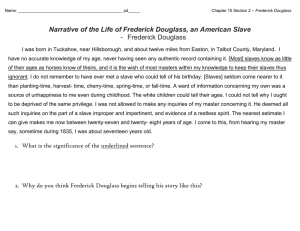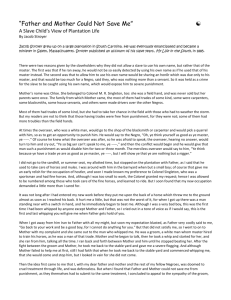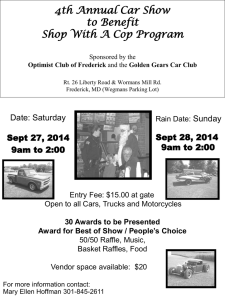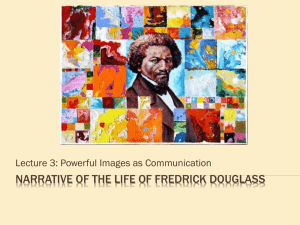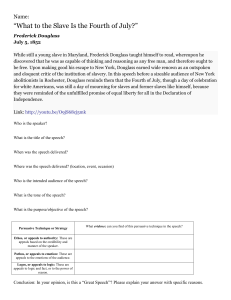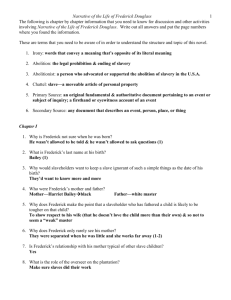NAME________________________________ NARRATIVE OF
advertisement
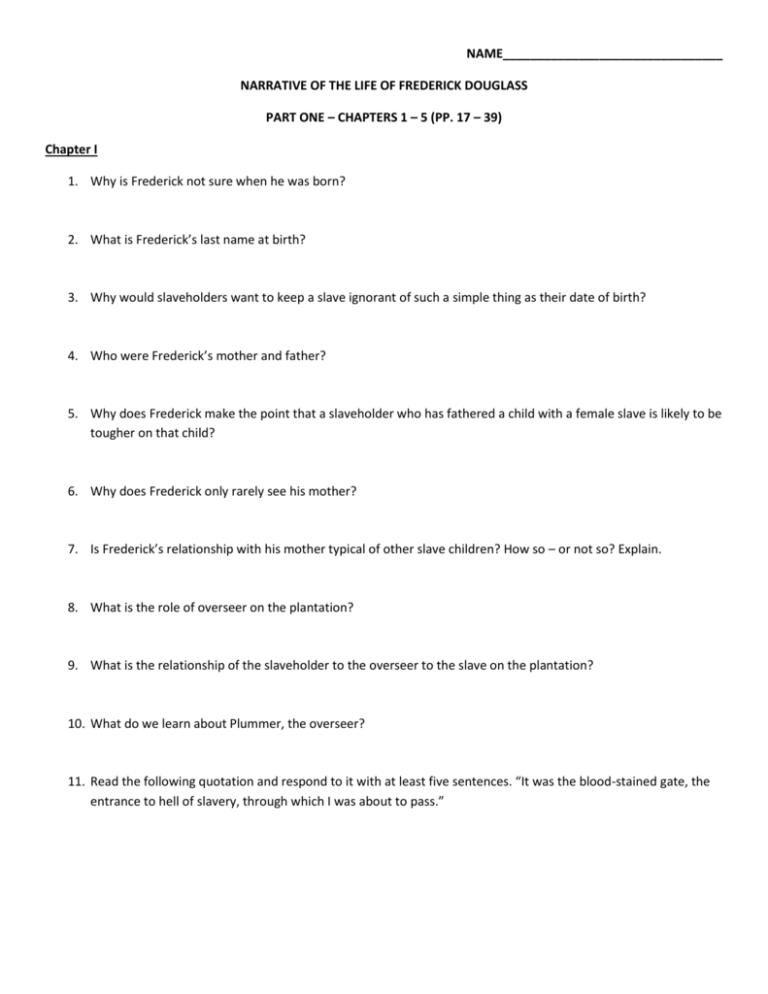
NAME________________________________ NARRATIVE OF THE LIFE OF FREDERICK DOUGLASS PART ONE – CHAPTERS 1 – 5 (PP. 17 – 39) Chapter I 1. Why is Frederick not sure when he was born? 2. What is Frederick’s last name at birth? 3. Why would slaveholders want to keep a slave ignorant of such a simple thing as their date of birth? 4. Who were Frederick’s mother and father? 5. Why does Frederick make the point that a slaveholder who has fathered a child with a female slave is likely to be tougher on that child? 6. Why does Frederick only rarely see his mother? 7. Is Frederick’s relationship with his mother typical of other slave children? How so – or not so? Explain. 8. What is the role of overseer on the plantation? 9. What is the relationship of the slaveholder to the overseer to the slave on the plantation? 10. What do we learn about Plummer, the overseer? 11. Read the following quotation and respond to it with at least five sentences. “It was the blood-stained gate, the entrance to hell of slavery, through which I was about to pass.” Chapter II 1. Who were the family members of Frederick’s mast Colonel Edward Lloyd? 2. What is the relationship of Colonel Lloyd to Frederick’s master? 3. Explain the pecking order among the slaves. 4. Why would a slave whose lived on a plantation be afraid of being sold to a slave-trader? 5. Why was Severe an appropriate name for the overseer? 6. Why is it difficult to find copies of slave songs? 7. Why, according to Douglass, do slaves sing out of sorrow rather than joy? 8. Respond to the following quote using at least five sentences: “Crying for joy, and singing for joy, were alike uncommon to me while in the jaws of slavery.” Chapter III 1. How did Colonel Lloyd keep the slave boys from taking his fruit? 2. Why was it particularly difficult to be the slaves in charge of Colonel Lloyd’s horses? 3. What is ironic about Colonel Lloyd’s treatment of his horses compared to the treatment of his slaves? 4. What happened to the slave who told Colonel Lloyd the truth about his master? 5. What is a maxim? 6. Respond to the following slave maxim using at least five sentences: “A still tongue makes a wise head.” Chapter IV 1. Why is Mr. Gore a “first-rate overseer?” Explain the irony in both the description of him as well as his name. 2. What reason does Mr. Gore give for killing Demby the slave? 3. What other examples does Douglass give of his statement, “that killing a slave, or any colored person . . . is not treated as a crime, either by the courts or the community.” 4. Respond to the following quote using at least five sentences: “He dealt sparingly with his words, and bountifully with his whip, never using the former where the latter would answer as well.” Chapter V 1. What was life like for Frederick and the other children on the plantation? 2. Why was Frederick so happy to be leaving the plantation? 3. Why did he particularly want to go to Baltimore? 4. What relationship did his new master have to his old master? 5. Why did Frederick, who was seven or eight, not know the month or year of his sailing? 6. What were Frederick’s initial impressions of his new mistress, Mrs. Sophia Auld? 7. Respond to the following quote using at least five sentences: “I may be deemed superstitious, and even egotistical, in regarding this event as a special interposition of divine Providence in my favor.”
